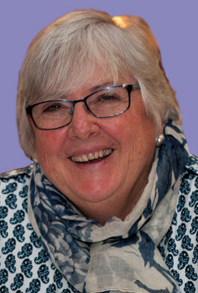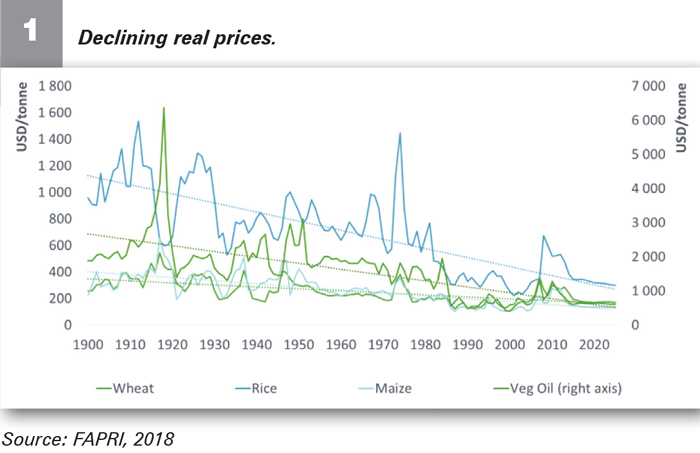May 2020
| Jenny Mathews, Pula Imvula contributor. Send an email to jennymathews@grainsa.co.za |  |
At the annual Grain SA congress which took place in March, delegates were inspired by speakers like chief justice Mogoeng Mogoeng and well-known agricultural economics expert Dr Ferdi Meyer of BFAP (the bureau for food and agricultural policy). Delegates were also tasked with the responsibility of electing new leadership to the organisation.
NEW LEADERSHIP FOR GRAIN SA
Immediate past Chairperson Jaco Minnaar has moved on to serve the sector on different platforms which meant Congress had to elect new top leadership. Derek Mathews, a farmer near Lichtenburg and past Vice-chairperson was voted in as new Chairperson of Grain SA while Richard Krige, previously a member of the Executive Committee and a farmer from the Western Cape was elected unopposed as new Vice-chairperson of Grain SA.
Delegates also voted in Ramodisa Monaisa to continue serving as Vice-chairperson for another term of office. He is a grain and livestock farmer in the Lichtenburg district. Jeremia Mathebula who farms near Ermelo and is already a member was also elected by Congress to serve on the Executive Committee.
CHIEF JUSTICE MOGOENG MOGOENG
Chief Justice Mogoeng told Congress: ‘South Africa belongs to all – not just some – who live in it.’ True to form Chief Justice Mogoeng asked Congress to pray with him before his address. He then expressed his feelings about the farming community: ‘Thank you, thank you, thank you. He said farmers play a critical role in pursuing the calling to produce quality food to feed humanity. He also recognised how many farmers have been facing challenging times and thanked them for ‘soldiering on’. Chief Justice Mogoeng empathised with farmers saying he understands how the frustrations experienced by other South Africans leave all farmers feeling despondent.

Issues
Some issues mentioned were:
Spotlight on our Constitution
Chief Justice Mogoeng turned the spotlight onto our constitution. We, the people of South Africa … It doesn’t specify any particular race, culture or creed – ‘we’ means everybody. It recognises the injustices of the past and accepts that South Africa belongs to all who live in it, united in our diversity and determines the constitution is an instrument for healing. He said we have to grapple with the historic realities as there will be no lasting resolution in the sector until we are brave enough, principled enough and sensitive enough to attend to cries for inclusive, meaningful participation and access to land. We have a responsibility to identify solutions in ways that build rather than divide, ensuring that ‘no ball is placed in the hands of opportunistic political players’ which will further divide us.
Deny the politicians the opportunity to divide us – we are a family. Our country needs healing from brokenness, suspicion, racism, tribalism, prejudices and mistrust. Whether we like it or not we are a family and we belong together. Chief Justice Mogoeng believes there is a oneness between fellow South Africans demonstrated because we find joy together. He says he looks forward to the day when the private sector, organized agriculture and government work more closely together than ever before.
Land redistribution
In past times land redistribution was not a success.
We need to tell our own stories
‘Until we have an avenue of communication there will always be fake news out there.’ Chief Justice Mogoeng encouraged aggressive communication to mainstream media with news of the good work being done. It is also important that the messages are not window dressing but true examples of the good work being done from Grain SA’s apolitical standpoint.
‘Sacrifice and compromise will be required of all of us, black and white.’ Chief Justice Mogoeng said he can vouch for the selflessness of farmers and their spirit of generosity and said he believes farmers have what it takes to contribute to the stabilising of the sector.
We need to know
Chief Justice Mogoeng encouraged farmers to demand speedy resolution of the land issue. He recognises we need policies designed to ensure meaningful productivity and sustainable farming opportunities and, in the process, he emphasised the need for current farmers’ experience and invaluable institutional memory. ‘I would hate to see farmers close shop because they can’t farm productively in South Africa. South Africa has a bright future and only you and I, with steely determination, can ensure this beautiful country does not go to waste.
DR FERDI MEYER
Dr Meyer addressed Congress on matters influencing the grain economy. He says if there’s to be any future growth, we need to attend to: 1) Partnerships, 2) what we focus on, 3) what issues we prioritise, 4) how we coordinate within the value chain and 5) how we execute policy. It’s not insignificant that Grain SA and BFAP have been collaborating to collect data and look for creative ways to carry strategic messages to policy makers, business and decision-making forums.
Bend the curve
What does he mean when he says: ‘We have to bend the curve?’ Statistics reflect steadily declining levels of profitability in the agricultural sector. All grain producers are under extreme pressure and face many challenges. A real price line graph shows a downward trend – which means less profits for farmers, higher risks and threats to sustainable farming. We have to find ways to bend the curve so that it points upwards and moves farming into a more viable and sustainable state.
 Look at Graph 1 which tracks the decline in prices received by farmers for their produce. The downward trend is worrying. We have to find ways to ‘bend the curve’ upwards so that farming is more attractive, more viable and sustainable. As farmers we need to be able to provide for our families and grow our businesses. With downward trends like this, we cannot.
Look at Graph 1 which tracks the decline in prices received by farmers for their produce. The downward trend is worrying. We have to find ways to ‘bend the curve’ upwards so that farming is more attractive, more viable and sustainable. As farmers we need to be able to provide for our families and grow our businesses. With downward trends like this, we cannot.
What will change things and help bend the curve?
We need to find solutions and raise our voices to policy makers and government so they can understand how fragile and vulnerable the agricultural sector is and what is required to fix it.
Jobs, growth and the National Development Plan (NDP)
Dr Meyer said there are some areas like under-utilised land and smallholder farmers where there should be great potential job opportunity but instead numbers have declined from 1,3 million in 2011 to about 1,2 million currently. But export-led sector jobs at farm level have increased and the agro-processing and integrated value chain has seen encouraging growth.
The maize value chain shifting to transformed state
Dr Meyer red flagged issues affecting long term sustainability. We need to construct messages that will bend the curve.
Potential
‘We have a lot of potential to bend the curve and create a downstream value chain in the economy.’
Take home ideas

Publication: May 2020
Section: Pula/Imvula